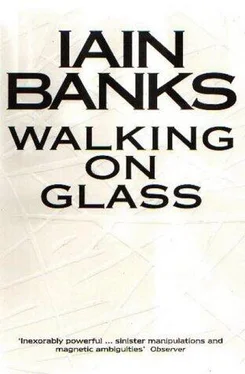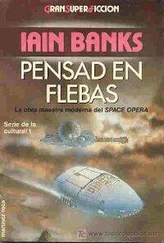Quiss came back to the table by way of another small, though taller, table over on the far side of the room, where a few dirty cups and cracked glasses stood in a small tin basin under a dripping tap. The tap was joined to a slightly bent length of pipe which appeared from a wall seemingly composed of tightly compressed paper. Quiss poured himself a glass of water, drank it.
Back at the games table he sat down in his straight-backed chair and stared across at Ajayi, who put down the slate she was studying. "Of course the damn thing's probably not working," Quiss said gruffly. Ajayi shrugged. She pulled the furs more closely around her. The wind moaned through the balcony window.
The castle had two names, as befitted its dual ownership. The side Quiss belonged to called it Castle Doors, Ajayi's side named it the Castle of Bequest. Neither name seemed to mean anything. As far as they could tell, it was the only thing which existed here, wherever "here" was. Everything else was snow; the white plain.
They had been there... they did not know how long. Quiss had found himself there first, and after a little while, when he realised that there was no night and day, just the one flat, monotone light always there beyond the windows, he had started to keep a tally of the number of times he slept. The record was scratched on the floor of a small cell in a corridor off the games room; his bedroom. There were nearly five hundred scratches on the glass floor now.
Ajayi arrived, seemingly deposited on one of the castle's high, flat, rubble-strewn roofs one night, when Quiss had made eighty-three scratches. They had bumped into each other that "day', and were delighted to find each other. Quiss had been lonely with only the castle's shy and dwarfish attendants for company, and Ajayi was pleased to find somebody who already knew their way round the cold, forbidding stump of rock, iron, glass, slate and paper which was the castle.
It had taken them only a short time to realise they were from opposite sides in the Therapeutic Wars, but it had caused little friction. They had both heard of this place, they both knew why they were here. They both knew what they had to do, and how hard it was going to be to escape; they knew they needed each other.
They had been Promotionaries, on their respective sides of the Wars (which were not, of course, between Good and Evil at all, as non-combatants of every species always assumed, but between Banality and Interest), with great things expected of them once their training and indoctrination was completed; but they had each done something silly, something which called into question their very suitability for exalted rank, and now they were here, in the castle, with a problem to solve and games to play, being given one last chance; a long shot, an unlikely appeal procedure.
And an unlikely setting.
What strange architect had designed this place? Ajayi found herself wondering every so often. The castle, rising on a single outcrop of rock from the plain, was built very largely of books. The walls were mostly slate, apparently quite normal, grained rock produced by a perfectly standard physical process of alluvial deposition. But when you loosened one of the slate blocks from the castle walls - an easy job, as the castle was slowly crumbling away- and split it open, on every surface so exposed a series of cut or engraved figures was revealed, arranged in lines and columns, complete with word and line breaks and what looked like punctuation. Quiss had demolished a significant part of the castle when he first discovered this, unwilling to believe that the stones, every one of them, all the tens of thousands of cubic metres the castle must be composed of, all those kilotonnes of rock really were saturated, filled full of hidden, indecipherable lettering. The castle's stunted squad of masons and builders were still working to repair the damage the old man had done by tearing down walls in his attempt to prove these hidden glyphs were isolated aberrations, not - as they indeed were - ubiquitous. This caused much grumbling and complaining, as the masons considered they were anyway fighting a losing battle against the castle's accelerating decay without its guests adding to their workload.
"You called?" a small, cracked voice said. Ajayi looked up at the door to the winding-stair expecting to see an attendant, but the voice had come from behind her, and she could see Quiss's face starting to turn red, his eyes widening, the lines around them spreading out further.
"Fuck off!" he shouted over Ajayi's shoulder towards the balcony. The woman turned round and saw that the red crow was perched on the balustrade, flapping its wings like a man trying to keep warm and looking in at them, its head cocked to one side. An eye like a small black button glittered, fastening on them.
"Given up on the game then?" the red crow croaked. "Could have told you the Silesian Defence wouldn't work in One-Dimensional Chess. Where'd you learn to -?"
Quiss stumbled out of his seat, almost falling, scooped a flat piece of slate from the floor and threw it at the red crow, which screamed and jumped out of the way, spreading its wings and dropping away, flying into the cold clear space below the balcony, its final call echoing briefly, like laughter. The slate Quiss had thrown sailed out through the balcony doorway after the bird, a stony imitation of its flight. "Pest!" Quiss spat, and sat down again.
The rooks and crows which lived in the decaying stumps of the castle's high towers could talk; they had been given the voices of Quiss and Ajayi's respective rivals, unfaithful lovers and hated superiors. They would appear from time to time and taunt the old couple, reminding them of their past lives and the failures or mistakes which had brought them to the castle (though never detailing them - neither Quiss nor Ajayi knew what the other had done to justify sending them here. Ajayi had suggested they swap stories, but Quiss demurred). The red crow was the most malicious and cutting, and was equally proficient at taunting either of the elderly pair. Quiss was the more easily riled, so he tended to suffer more than his fair share of the bird's abuse. He shook with fury sometimes, as much as cold.
It was cold because something had gone wrong down in the castle's boiler room. The heating system was breaking down, needing repair. Hot water was supposed to circulate beneath and above every floor. In the games room, supported by slate and iron pillars, a tracery of iron girders held the low glass ceiling. Inside the glass was water, about a half-metre or so of slightly cloudy and salty water the boilers were supposed to keep warm. The same went for the glass underfoot; another half-metre of water lay underneath the transparent slabs which made up the floor, gurgling under the scratched surface and around the slaty pedestals supporting the columns above. Long gelatinous-looking bubbles of air moved like pale amoebae under the false ice of the glass.
Luminous fish lived in the salt water. They swam like long rubbery strip-lights through the water's gentle currents, and kept the rooms, corridors and towers of the castle bathed in a silky, pervasive light which sometimes made distances hard to measure and gave the air a thick sort of look. When Ajayi had first arrived the games room had been just right, held at a pleasant temperature by the warm fluid circulating above and below, and enjoyably light as well, thanks to the fish. The odd system had seemed to work.
But now there was something wrong, and most of the fish had retreated to the castle's still warm lower levels. The castle's black-cloaked seneschal had scowled darkly on the previous occasions when Quiss had tracked him down in the kitchens and asked him what was going on and what he intended to do about it; he made dour excuses and talked of the corrosive effects of salt water and what a mess it made of his pipes and anyway materials were very hard to come by these days - What days ? Quiss had exploded. There was only one day, wasn't there, or did they have days here but they were just very long? The seneschal had gone quiet at that and sunk his thin grey face back into his hooded cape, while the huge human stood glaring at him, quivering with impotent rage.
Читать дальше












